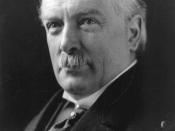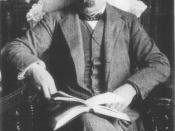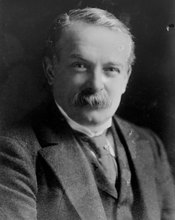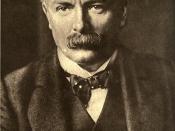Question 6 The post-war society in Britain was certainly far from the "land fit for heros" that Lloyd George promised in his 1915 election speech. The world that servicemen had to face was one of hostile ignorance. Men had trouble being released from the army, getting understanding from society both psychological empathy and economical support or dealing with the new societal reshuffles.
The first was the hardship of dealing with an extremely bleak employment situation. As servicemen returned, the nation fell out of a total war situation and the economy was in turmoil. Over a million men and women had been working in munitions. Since the war was over, these people now had little to no work. The same applied to every war-based industry. As all these people attempted to find work, servicemen started to come back to Britain. The government foresaw the employment issue becoming a national emergency, and so did not allow the British soldiers their leave from the army until they had secure employment.
This particular approach was counter-productive since there was no way any of the men could look for work as they were still living and working full time with the army. This was far different to a world fit for heroes, where fighting men could come home to the same jobs they had.
As such the men were extremely angry. Folkestone Camp, Dover, Bromley all saw thousands of men rioting. At Sutton Camp in Surrey it needed two full battalions of guards and one full machine gun company to restore order from a group of soldiers who had mutinied. At Epsom a police station was razed, killing a civilian officer. By the winter of 1919, the government could not hold them any longer, and released the men from uniform.
It was only in late 1919 that the government made slight inroads into a truly fit land, by making pensions a statutory right, training of disabled men and setting up a labour exchange program.
However there were other strains on Britain at the time. The influx of British wounded or hurt set huge strains on the health system. Twice the number of men at the front contracted V.D than that of trenchfoot, frostbite and pneumonia combined. Diseased and disabled men piled into the hospitals. This meant that the influenza pandemic that killed more people in 1919 than were killed in the entirety of the Great War was so effective. People could not get fast or effective treatment or vaccines. This again took attention away from the soldiers' sacrifice.
Another problem was the pure incomprehension of society. No-one understood the horrors they had seen, and if they attempted to express it to anyone they were seen as irrational. Such lack of support meant that in this "land of heroes" the men usually needed 10 years before they could exercise their demons and get on with their lives. These years were very turbulent for all the servicemen, with high percentages of marriage break-ups and alcoholism.
The soldiers also had to deal with a misplaced class system. Those that got into well-paid jobs in the soldiers absence earned far above their usual wages and had grown accustomed to more expensive tastes. This led to an economic slump in 1921, leading to more hardship. A soldier might find his family or friends spending far more than they used to. This profiteering from the war was yet another form of isolation and loneliness, far from a heroes reception.
Any attempt to make post-war Britain a "land fit for heroes" was always going to be a futile gesture. The nation was politically and economically without direction, as it had just emerged from total war. Unemployment was rife, hospitals were overworked and times were hard. As such the people did not attempt to understand, or make welcome the soldiers. The land fit for heroes that Lloyd George boasted of was confused, hostile and uncaring.





